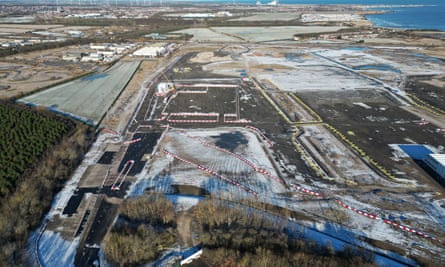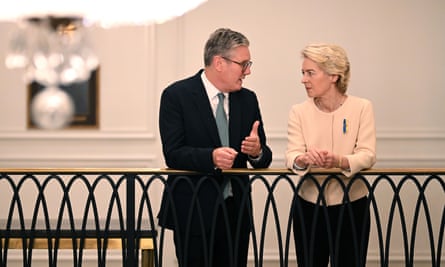Keir Starmer is set to announce the creation of a £10bn AI datacentre, bringing 4,000 jobs to north-east England, which will be funded by a private equity firm run by a big Donald Trump supporter.
The prime minister is due to host chief executives in New York on Thursday, where he is trying to drum up interest in foreign investment into the UK. He will hail the investment in an “artificial intelligence datacentre” – due to be built in Blyth in Northumberland by Blackstone – as a “vote of confidence in the UK”.
Blackstone’s founder, chair and chief executive is Stephen Schwarzman, a Republican who said in May he was backing Trump for the presidency. Schwarzman made an estimated $896m (£670m) in pay and dividends from Blackstone in 2023.
The deal has been in the pipeline for a while, after the site was bought by the investment company in April on the location of the failed Britishvolt battery startup. That project had been set to create 3,000 jobs.
Construction on the site is expected to begin next year, with the centres designed to store the data needed to power AI and the information generated by AI systems.

Blackstone said it would invest £110m into a fund to support further skills training and transport infrastructure in the area.
Starmer is set to meet Blackstone’s chief operating officer, Jon Gray – a Biden supporter – as well as representatives of Carlyle Group, another private equity firm; the Australian-based bank Macquarie; the investment fund Global Infrastructure Partners; and the US banks JP Morgan, Bank of America and Citigroup.
Ahead of the meetings, he said: “The No 1 mission of my government is to grow our economy so that hard-working British people reap the benefits – and more foreign investment is a crucial part of that plan.
“New investment such as the one we’ve announced with Blackstone today is a huge vote of confidence in the UK, and it proves that Britain is back as a major player on the global stage and we’re open for business.”
The prime minister will also visit Brussels next week as he steps up efforts to “reset” the UK’s relationship with the European Union.
Ursula von der Leyen revealed that Starmer would visit Brussels next week after the pair met in New York. “Good to see you in the margins of UN general assembly,” the European Commission chief tweeted . “Looking forward to welcoming you at the EU Commission in Brussels next week to discuss the reset of EU-UK relations.”
The meeting is something of a breakthrough and could suggest a softening of Starmer’s position on the details of a reset including a youth mobility programme. It comes after some EU diplomats were questioning whether Labour was sufficiently different in its approach from the Tories to warrant a meeting before the end of the year when the new European Commission is installed.
Starmer has made investment in the UK a major priority since taking office, telling business leaders at Labour conference last week that they should come straight to No 10 if they have any problems. He is accompanied in New York by his business adviser, Varun Chandra, who previously ran the corporate intelligence firm Hakluyt.
after newsletter promotion
The government is also focused on its international investment summit in October, which is taking place several weeks before the budget, and hopes to have an investment minister in place before then.

Labour ran its biggest ever business day at party conference this week, with more than 500 lobbyists and executives in attendance, from companies including Uber, Blackstone and the oil companies ExxonMobil and Shell, as well as the banks Citigroup and JP Morgan Europe.
Many of the questions from the floor pressed for more details on the government’s planned industrial strategy, its approach to taxation and how it would implement its package on workers’ rights.
The government is consulting on plans to raise taxes on private equity firms, with the chancellor, Rachel Reeves, having hoped to bring in at least £500m. However, the industry has been lobbying against the plans to close a tax loophole which would change the way that people who work in private equity pay capital gains tax rather than income tax on profits from their investments – known as carried interest.
A Treasury analysis has shown that about 3,000 people received carried interest in 2022, paying a tax rate of up to 28%, rather than income tax, the highest rate of which is 45%.
Source: theguardian.com


